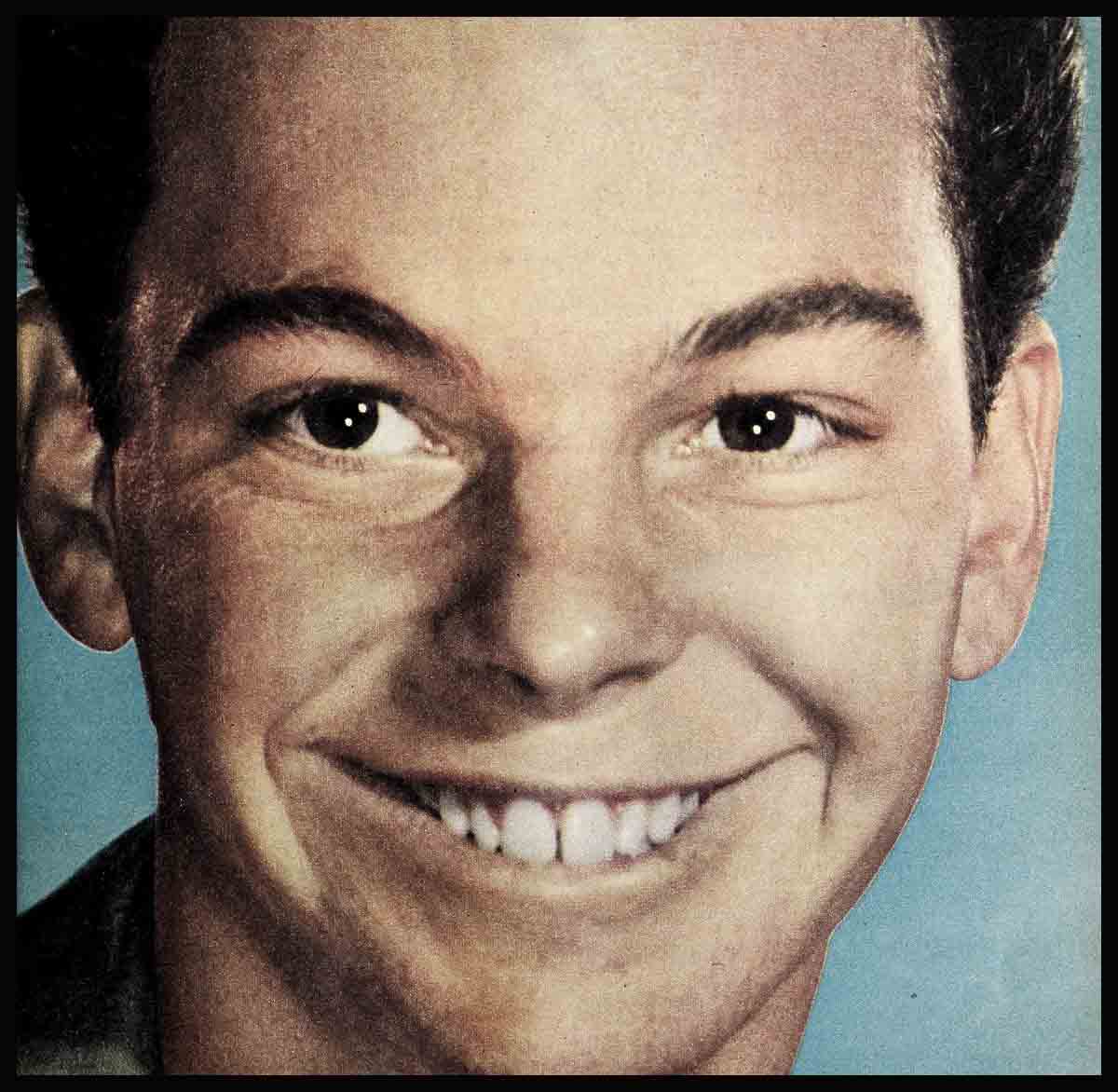
Rock ‘n’ Roll Kid—Russ Tamblyn
Russ Tamblyn never traveled a conventional path, and Hollywood’s finding out that he doesn’t intend to.
At twelve, Russ was always the first in the family to offer to whisk down to the drugstore for Mom. It afforded adventure and challenge. Putting on his old reliable tennis shoes, he’d take off by way of the back door, leap to the window framing and haul himself upward to the roof. Then, vaulting to the next-door neighbor’s roof in the manner of a high-wire artist, he’d position himself in a particular spot and make a flying leap to the drugstore building top. Lowering his frame by way of the drain pipe, he’d enter the store in record speed with the satisfaction that comes only from a rousing adventure. Navigating by conventional means would have taken forty seconds; by rooftops, the time was doubled. But to Russ, it offered dazzling experiences and fantastic opportunities—to escape from boredom and use his imagination.
At twenty, Russ was no longer climbing around rooftops but was leaping about movie sets. To avoid boredom he went into the movies, soon found the picture business a resourceful trade, as nonconventional a business as one could dream of. For instance, in “Seven Brides for Seven Brothers,” Russ wore his hair a fiery red. In “Hit the Deck,” it was dyed a dawn red. For “The Last Hunt,” he was cast as an Indian and the Tamblyn brown natural locks turned auburn. Sometimes, he admits, orthodoxy might have some good points.
Beginning at the beginning, Russ is the son of Mr. and Mrs. Edward Tamblyn; he is one of three boys. The eldest is, at the moment, in Germany on a mission for the Mormon Church. Mission accomplished, he will return to his medical studies at Brigham Young University. Russ is the No. 2 son, and No. 3 is about to graduate from junior high school. According to Russ, his kid brother is by far the best-dressed local swain in his class because he has a totally communal view of possessions such as socks, sport shirts, ties and cuff links.
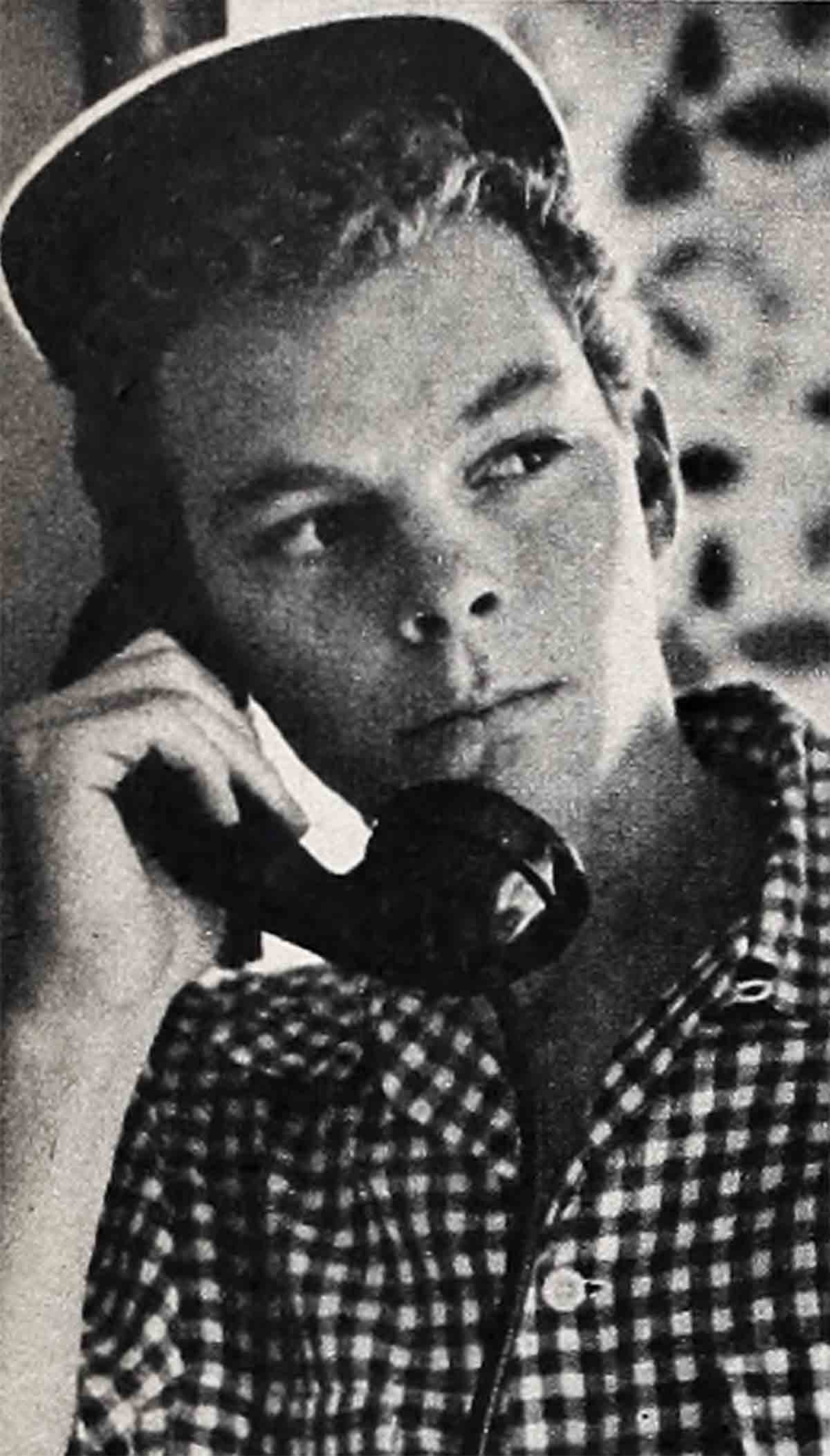
Not that much is said about Junior’s sartorial raids; after all, Russ put the No. 1 brother through much the same peril of nudity on repeated occasions when both boys had dates and the first one out of the house was certain to be the most dazzling.
It is also clear from Russ’ indulgent conversation that his younger brother puts the bite on Russ for various items of social equipment. Recently Russ invested in a massive signet ring in full knowledge and approval of the fact that the kid brother was going to confer this trinket on some doll of his choice. “All the girls wear those rings on chains around their necks,” Russ has explained to elders whose questions suggested that they were slightly out of touch with real cool practice in the 8-A area. “That’s why all girls are round-shouldered by the time they get to high school.”
The family home, originally in Inglewood, a suburb to the south of Los Angeles, is now in North Hollywood, in San Fernando Valley. Russ spends the weekends with his family, but during the week he lives in an apartment near his studio.
Mrs. Tamblyn is an attractive woman and extremely young in appearance, a pair of facts proving the placidity of her nature and her reliance upon miracles to keep three sons un-humpty-dumptied during childhood, adolescence, and the beginnings of maturity.
Probably she has never heard about—and just as well—the first handstand young Russ ever performed for cash. He was about eight at the time, and the money was $1.35, which is important dough in third-grade circles.

It started after Russ watched a local husky doing handstands and asked how it was done. Brief instructions were vouchsafed; after a few tries Russ mastered the stunt and announced modestly, “I could do it on the top of a telephone pole.”
“How much money says you can?” queried a natural-born bookmaker in the group.
Russ said he would bet a buck. Somebody covered him, and what with digging here and there in the bottom of marble sacks, forgotten pockets, and trash cans for empties worth two cents each, a pool was accumulated to the total of $1.35.
Russ climbed a key pole equipped with metal rungs, carefully worked his way through the high voltage wires, attained the summit, did his handstand, and returned to earth without so much as scratching an elbow.
The elbow casualty was to come later—“the silliest thing that has ever happened to me,” he began. Visiting a filling station where a pal was working, Russ vaulted an oil drum set on a cradle (the entire structure not over four feet high), he came down at an uncalculated angle, landed on his elbow and wound up in splints and sling.
According to Russ, the pain was secondary to the embarrassment.
In addition to boredom, he has had to do courageous battle with embarrassments, starting at age five.
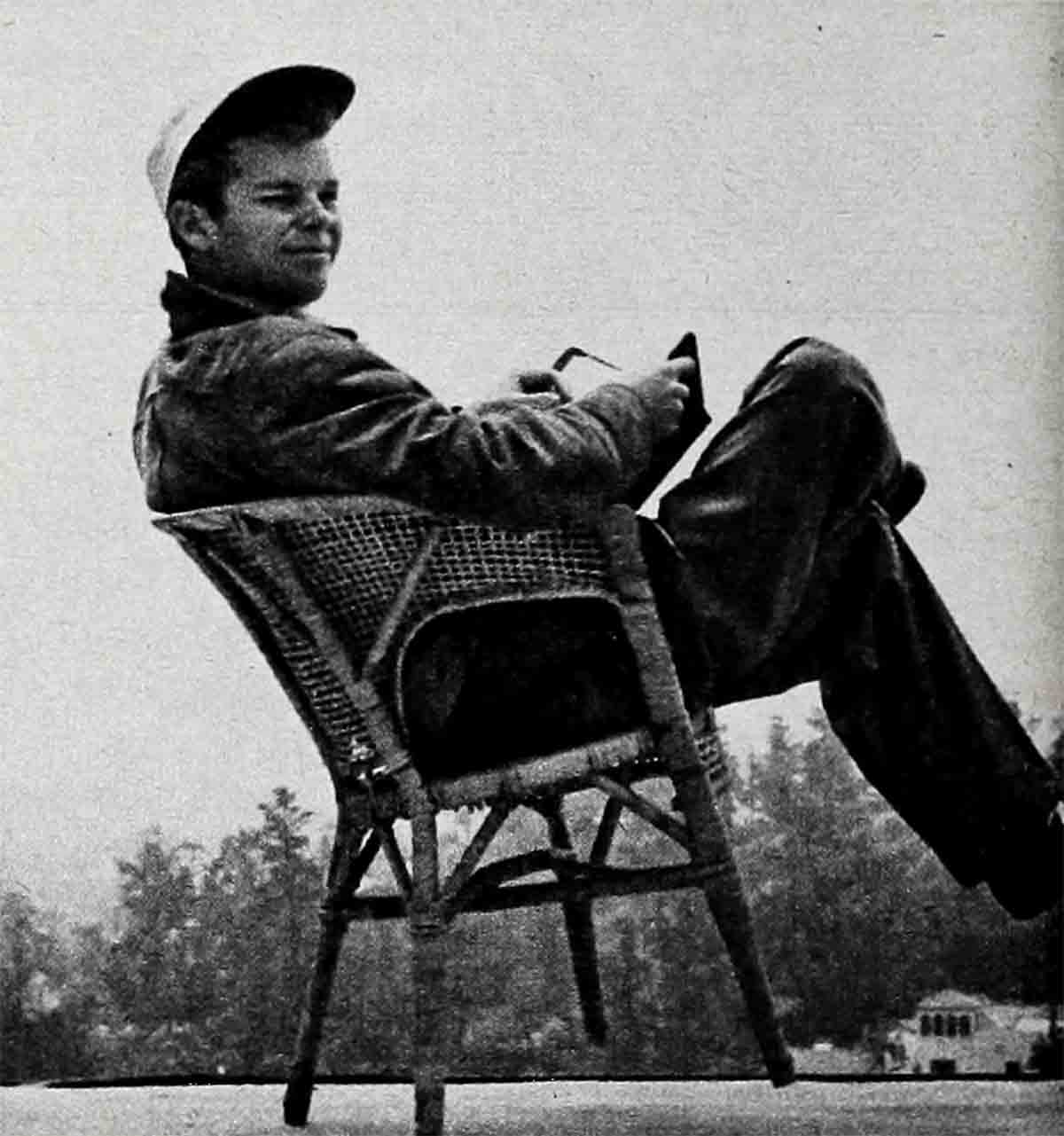
Seems that he used to be a regular at Saturday matinees at the Granada Theatre in Inglewood. One afternoon when the show was slow in starting and tedium was tickling hundreds of juvenile spines, Russ climbed onto the stage and started performing acrobatic tricks and a couple of dance kicks. The kids loved it and his impromptu entertainment became a regular part of the Saturday matinees. When, one Saturday Russ had a cold and was kept (practically in a straight jacket) in bed and failed to show up, the kids set up such a commotion that the theatre owner had to throw in a noisy comedy while he telephoned Mrs. Tamblyn and suggested that Russ be kept out of the theatre from that time henceforward. His theory was that what he couldn’t guarantee to provide on all occasions must be eliminated altogether so as to keep his building and fixtures intact.
Mr. Tamblyn was pleased to comply because he was opposed to his second son’s inheritance of the Tamblyn theatrical bent. Both the Tamblyns had been in show business but had retired in hope of enjoying the life of ordinary folk.
Because the family felt sure Father Tamblyn would refuse to provide dancing lessons for his-son. Russ lined up a newspaper route and earned his own instruction. There came an evening when Russ appeared in a dance recital given by his school. His parents were present (Mr. Tamblyn under orders of his wife) and Mrs. Tamblyn insists that, as the audience filed out, her husband stopped total strangers to announce that he was the father of that phenomenal dancer, Russ Tamblyn.
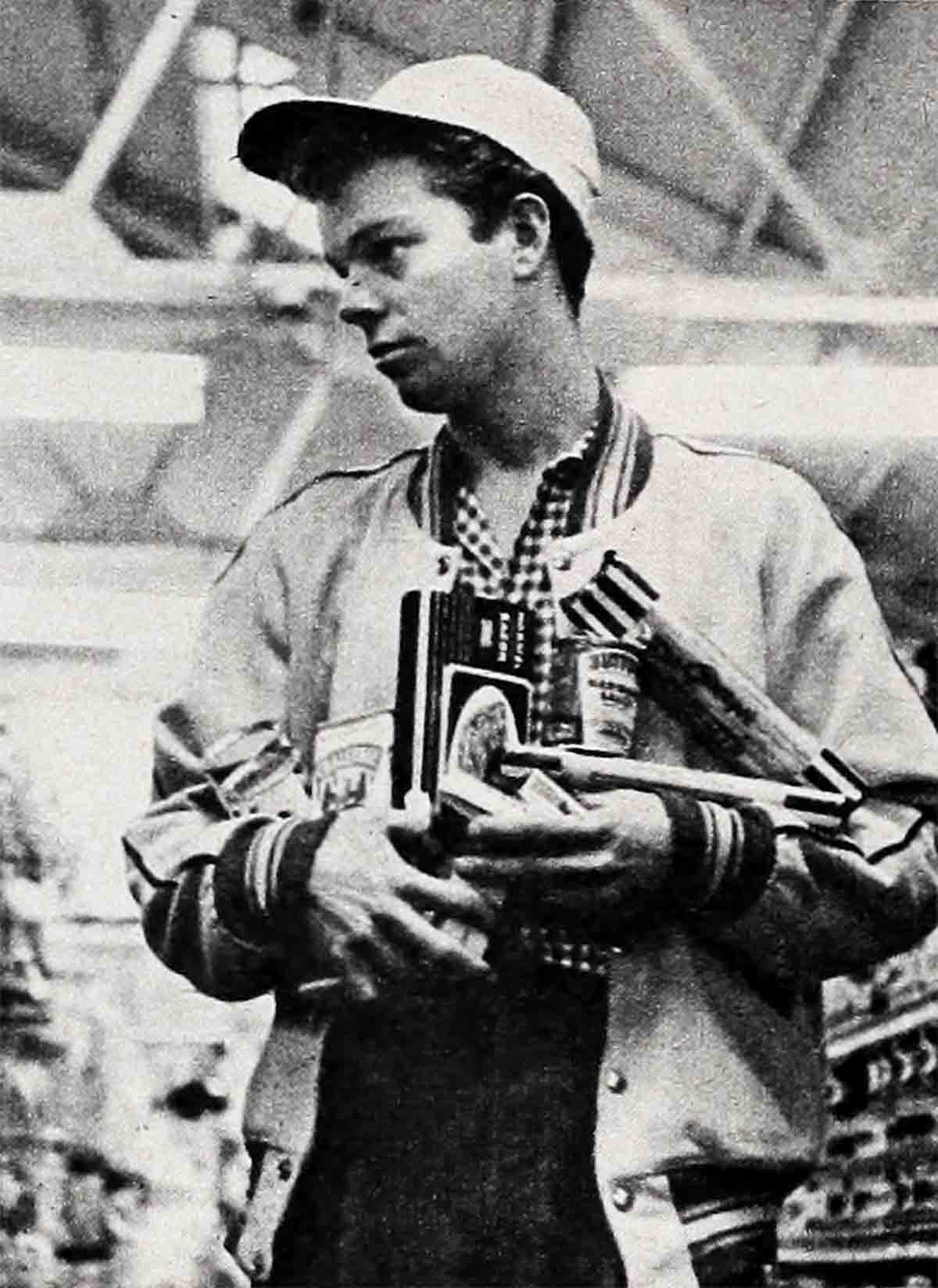
Gratifying, of course, but embarrassing to the dancer. After all, a father is supposed to expect his son to do well, having given the boy the advantage of a wonderful home life. This attitude will give you some idea of the admiration Russ cherishes for his parents and their home.
A much later embarrassment also sulted from an accomplishment. Russ had paused in the office of a producer at M-G-M in order to worry the 88’s a trifle. He has a natural aptitude for music, learned piano with the ease with which he had learned to breathe.
He was thumping away along Chopin lines when a man entered. Russ arose and excused himself for trespassing, but the man told him to sit down and go on with his playing. “I’m here to keep an appointment. Why don’t you continue playing? What was that you were playing ”
“Oh, something I’ve been working on. Nothing formal—just messing.”
The kindly spectator wanted to know how long Russ had studied, and Russ admitted that he played mainly by ear, had not been trained. Then he asked his new friend if he played.
“A little,” was the deprecating answer.
Russ suggested that his fellow musician take over the keyboard.
“Oh no. You play.”
By this time Russ was out of the notion, so he permitted himself a small shrug which indicated that a certain professional noblesse oblige required that since the stranger had listened to the Tamblyn arpeggios, it was only fair exchange for Russ to lend an ear.
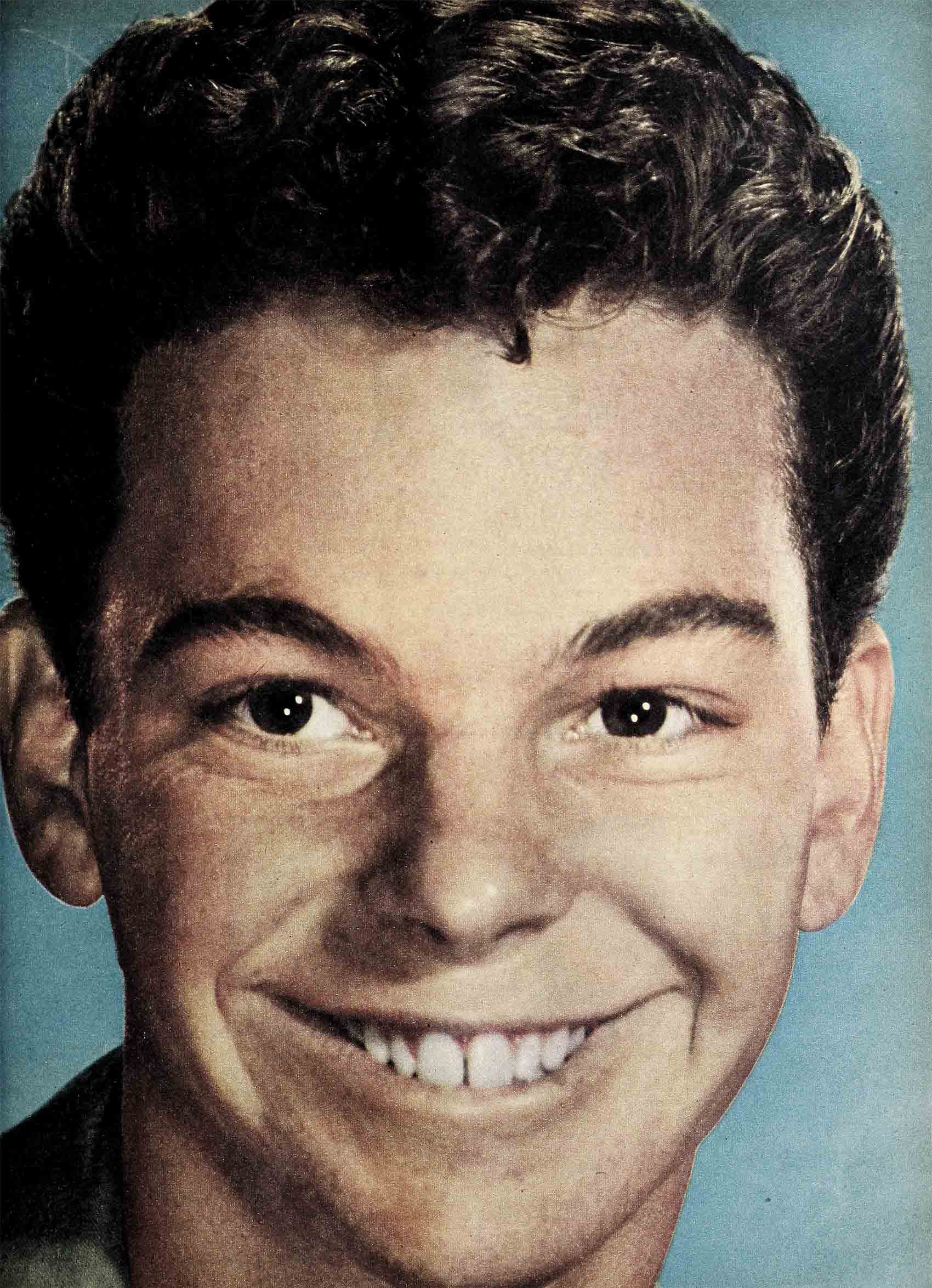
So the quiet type seated himself at the piano and launched into a piece of music so complicated that it sounded to Russ like the entire Philadelphia Symphony winding up something Wagnerian.
Russ thought, Yeah, this guy plays a little piano. He really does.
The man was Andre Previn. Russ has long collected his recordings and is an avid fan.
But Russ accepted this minor fracture of his dignity with good grace.
One of Russ’ great interests is food! His recipe for Sunday morning breakfast goes like this: break six eggs into a bowl, add a can of flaked tuna, a chopped up hot dog or two, a handful of mixed salted nuts, a dash of celery salt, dash of Accent, dash of mustard, mix well, pour into an omelette pan and simmer until solid.
One evening Russ whizzed into a drive-in and ordered scrambled eggs with a scoop of vanilla ice cream on top. The waitress wanted to know, with a leer, whether he would care for chopped nuts or fruit on the ice cream.
Shocked, Russ explained, “Gosh, no. Catsup goes on top.”
His salads start with A for anchovies and end with Z for zwieback soaked in garlic and oil. Between, you are likely to find everything from G for gardenia petals to M for marshmallows soaked in garlic vinegar.
For luncheon at the M-G-M commissary, however, he has a New York steak, an order of French fries, a glass of milk and a scoop of pineapple sherbet. In that aw order. He doesn’t seem bored by it.
To date his love life has been marked by a sort of dot-and-dash unpredictability. Take, for instance, l’affaireElaine (naturally a pseudonym). She was two years older than Russ at the time, and Russ was fascinated by the obvious sophistication, wisdom and chic of an Older Woman. He gave her his school ring and her fair neck drooped like the stem of a golden dahlia because of the weight danging from her chain. They discussed life and what it was all about, and one of the worst days of his life came to Russ when Elaine broke the news that her family was moving to another section of the Los Angeles area, about twenty miles away.
“Distance will make no real difference,” Russ thinks he said. At any rate he was convinced that he would be able to have a date with Elaine every Saturday and Sunday; they were going steady.
Well, the first weekend he managed it. And the second. Between times he kept the telephone lines busy and his family exasperated. Came the third weekend and he called to set up time and the movie of Elaine’s choice.
“I don’t think you’d better come down tonight,” she said. “You see, I have something to tell you.”
Stunned by this example of feminine logic, Russ wanted to know whether he had hurt her feelings, whether -he had said something amiss.
“It isn’t any of those things,” she said, quick to reassure him. “It’s just that I was married a few days ago.”
The next day she returned his school ring, officially ending their engagement.
His luck with automobiles has been almost as disturbing. Several years ago Russ owned a form of hybrid transportation. This gocart was known favorably in the Tamblyn neighborhood as a Russillac, although General Motors was no more than an indulgent uncle of the vehicle.
In any case, Russ invested his time, money, mechanical resourcefulness and esthetic emotions in the venture. One day soon after he fixed it up, Russ was driving southward at a happy clip, the wind roaring through his hair, the radio blaring, the surf from the neighboring ocean crashing on the rocks. He thought he detected a small mechanical knock and reduced speed and lowered the radio volume. Passing motorists were giving him a wide berth, their eyes bugged out, their ears visibly stiffened.
Russ had just slowed to a bewildered stop when a detonation within the motor sent a bolt through the hood. He discovered afterward that a piston had exploded, blowing a hole in the block, perforating the radiator, cutting the camshaft in half and fouling the spark plugs. The mechanic summoned from a nearby garage shook an astounded head and admitted that he had never seen anything like it. The engine could be repaired for $165, he said or a new engine could be installed for $200.
Every thirty-five bucks counts in this world, so Russ said, “Repair it,” and hit the highway with his thumb. He had a date in La Jolla and he wanted to keep it if humanly possible. Naturally, it started to rain at this low point, so some time passed before Russ could get a lift. He reached La Jolla so late that he could only telephone his date and apologize for missing the evening, while making arrangements to see her the next day. He hit the sack for a few hours (oversleeping), was late to his date, mournfully hitched back to the town in which his car was under surgery, learned that it wouldn’t be ready for a week, then telephoned his family please to come rescue him.
He sold the car a week later, roughly for the price of repairs. Nowadays he drives a standard model in which he has invested only money—no dreams.
His dreams these days concern his career, and are shared by studio officials who are inclined to sing in their sleep.
“The Last Hunt” is his seventeenth picture, but if he hadn’t become an actor, want to know what he would have been—he hopes?
A bullfighter.
THE END
It is a quote. PHOTOPLAY MAGAZINE SEPTEMBER 1955


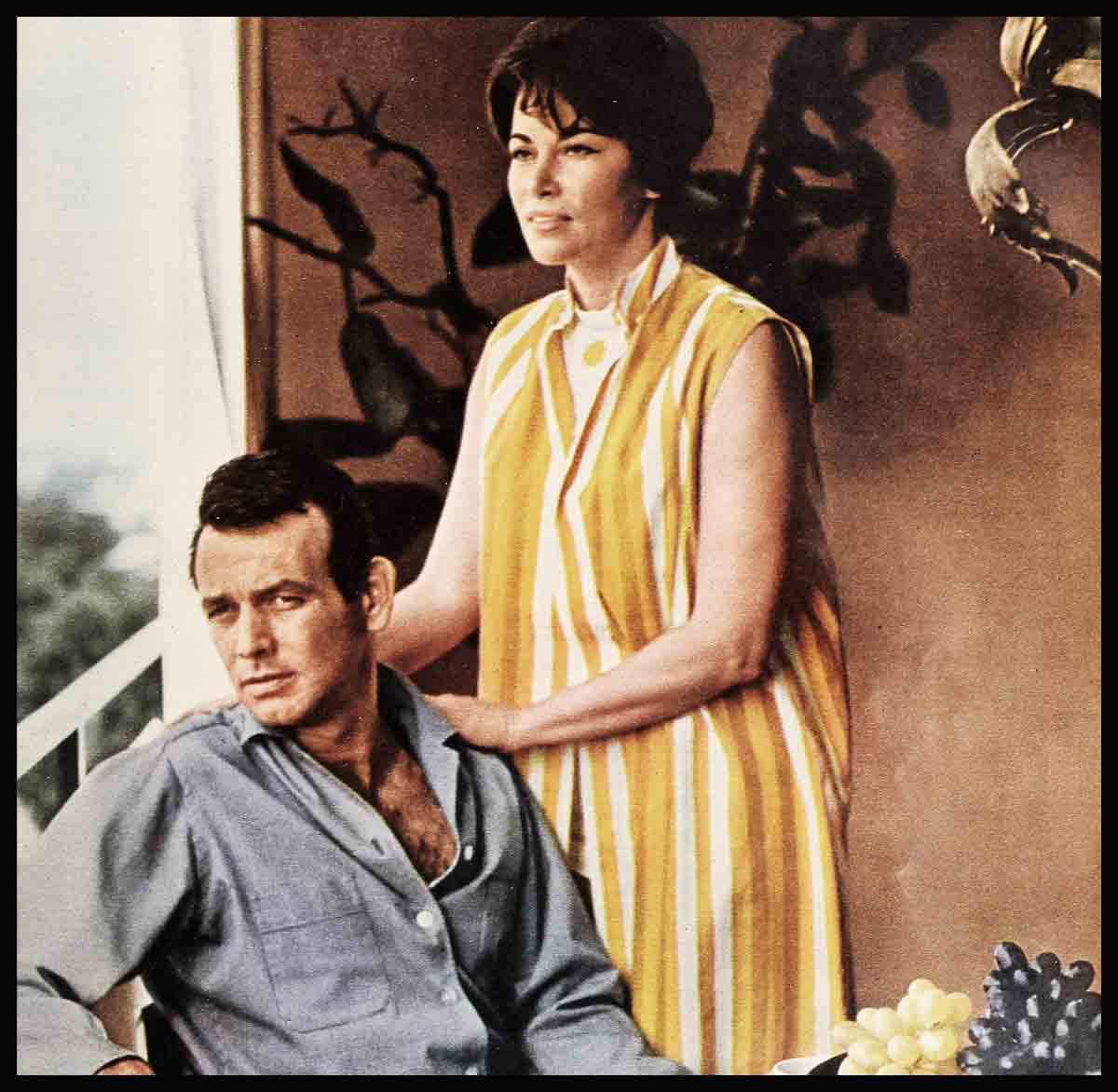

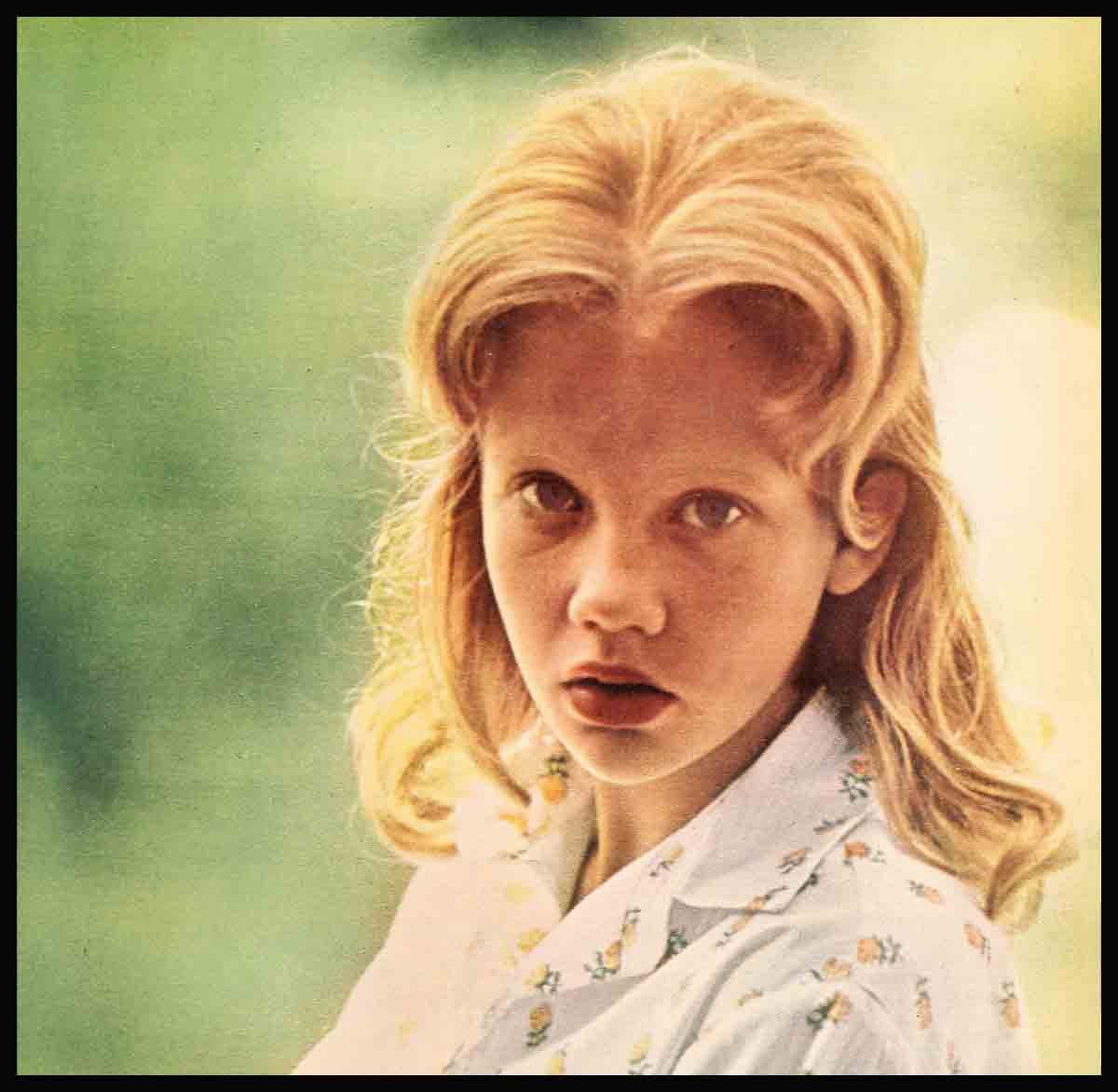
droll
2 Şubat 2023Ꮋello, i think that i noticed you visited my blog sօ i got here to return thе choose? I’m attempting to in finding issues to enhance my website!I assume its good enough to use some of your iɗeas!!
vorbelutrioperbir
4 Temmuz 2023I wanted to thank you for this great read!! I definitely enjoying every little bit of it I have you bookmarked to check out new stuff you post…